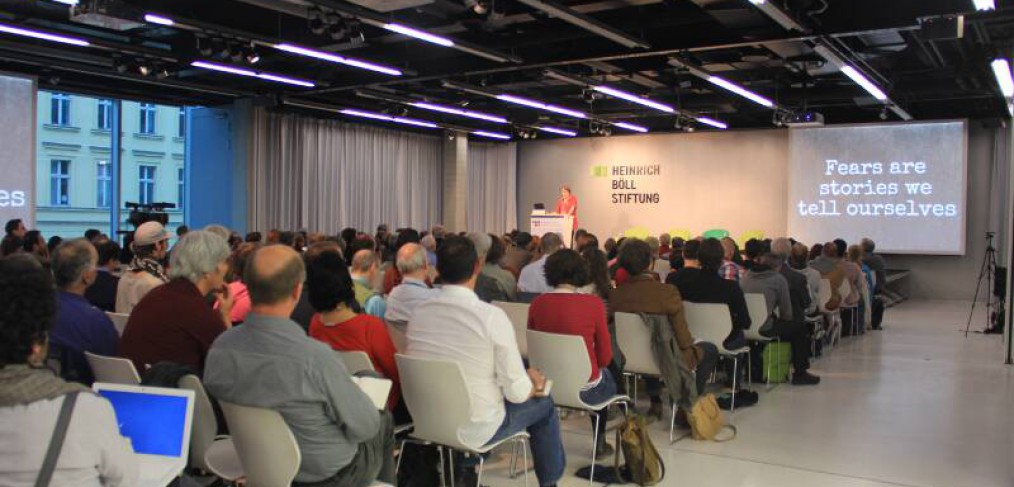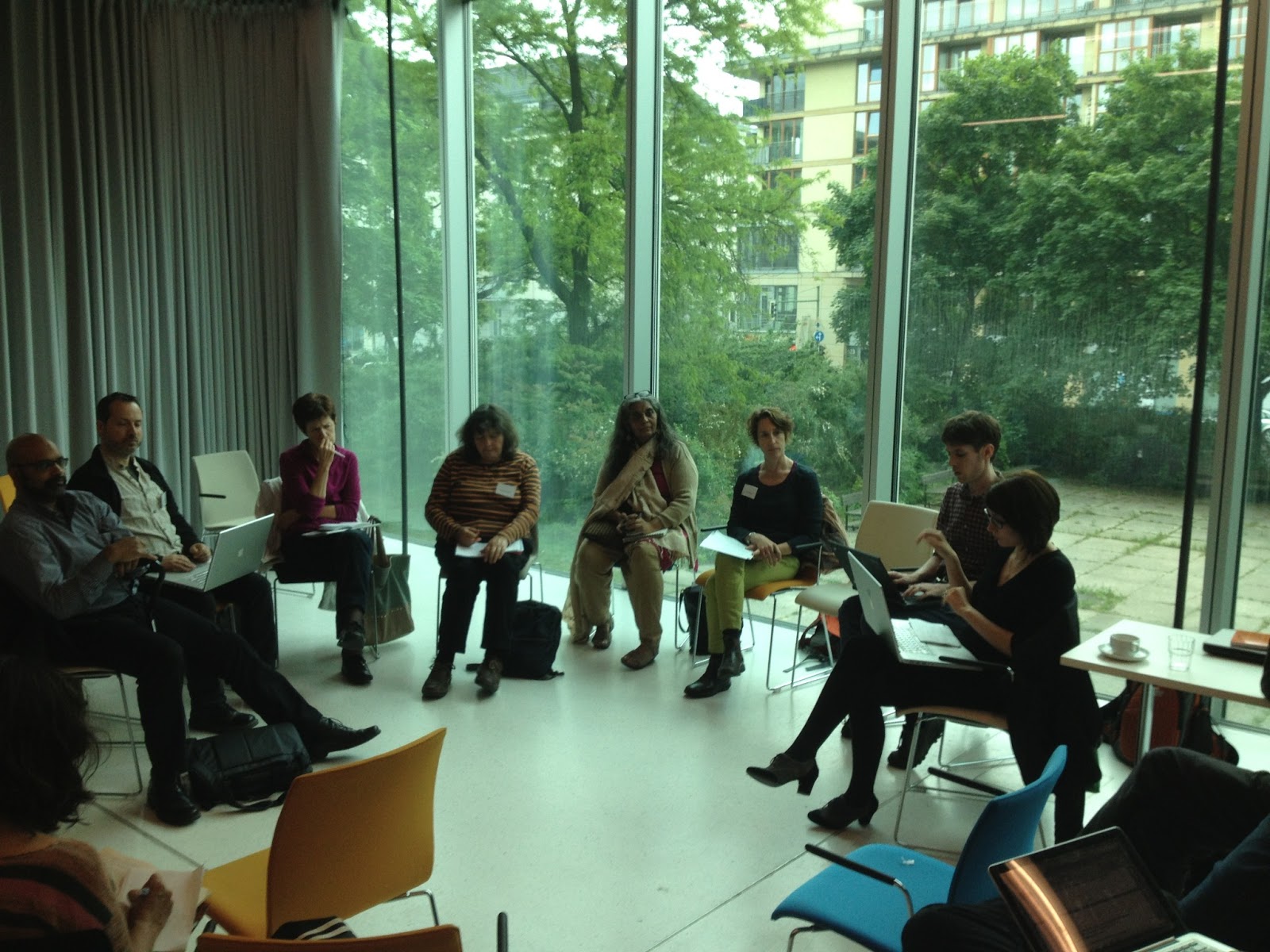
Towards a Commons Creating Peer Economy
Silke Helfrich
I was honoured to give an introductory talk for Commons Strategies Group on the Economics and the Commons Conference (May 22 – 24, 2013, Berlin). The talk was prepared together with my fellow commoner David Bollier. It suggests some elements for the self-understanding and identity of the commons movement and introduces the notion and the principles of a Commons Creating Peer Economy (CCPE).
What do we mean by Economics and the Commons?
Silke Helfrich/ David Bollier (Commons Strategies Group)
(speaking notes/no full text available)A frequent question is: “How do you get to the commons? We know a shortcut. Go to Colchester/UK and take tram 68 🙂
In fact, the way to the commons is complex and multifacetical, but there is a real “eruption” of commons projects, initiatives, publications and research proposals happening. Many activities are going on spontaneously, without coordination between them, therefore we’ll start with the presentation of more than a dozen international projects in shorthand terms – from Masipag to Wikispeed, from The whole Bakery to Libre Office, from the Great Lake Commons to the several Schools of Commoning popping up in Europe.
The question we’d like to ask is: Are these projects and the ideas behind them truly related? What do they have in common? Is there a shared something in these examples that could be the basis for a larger political movement?
We believe there is! And we believe, that identifying and crystallising it, will help overcome the crisis of political vision – the political exhaustion and fearful, short-term approaches that keeps us trapped in an either/or box. Our challenge is to make sense of this enormous diversity and to develop the relationship among all these commons. Because robustness and coherence within the commons can fill an incredible void in our political and cultural imaginations.
As far as we can see, there is no credible alternative vision, neither within the system (political parties), nor among alternative political movements (many – highly appreciated – but fragmented/ incomplete or narrow in focus debates are everywhere).
The problem with this is, that “the world around us”, is strategically very well positioned. Market-fundamentalism is everywhere. It is the default norm for all conversations in economics, policy and politics. This is a symptom of the fear and lack of imagination. The idea that all solutions must come from a rigid blueprint. This ethos and worldview has penetrated into the deepest and most remote corners of our lives and livelihoods.
Ex: enclosures, privatizations, exploitation of natural resources, financialization, land grabbing – pushed forward by legal frameworks based on market-fundamentalist thinking:
Most of these enclosures get legal support and framing trough the Free Trade Agreements. The latter enclose everything in anti-commons/ anti-cooperation principles like the most favorite nation principle(MFN).
But the most sophisticated and dangerous dimension of it is the market-fundamentalisation of our minds.
People tend to think (first and foremost) in terms of markets – “unique selling points” (even applied to human beings)”, “exchange-value”, “business models”, “capitalization”.
Instead of asking: Does something make sense to human well-being? Does it enliven us? The only question that anyone seems to ask: “How can I make money out of it?”
Our very language is a strait-jacket. And it is performative. It makes reality and it shapes the way we think. Let’s name it – the colonialization of our minds and of our language within a marketized word.
And yet market fundamentalism is just an idea/ a mindset. That is: We can challenge it with other ideas; with a different mindset. We can bypass, hack or undermine the market-state duopoly based on market fundamentalism with a coherent concept of the commons. And to do so, we also need to demarketize our vocabulary and to commonify our minds.
The commons is both: a core idea of a fairer and free world and a wide range of social practices that help us meet our needs.
Before I start digging deeper into the “economics and the commons”, let me quickly clarify 4 conceptual points on the notion of the commons itself:
1. The commons is not a resource, but a process. For example: The sentence: “Water is a commons” is a bit weird. “Water can/must be converted into a commons.” That’s the challenge. Actually, water can be treated as a private good or a public good or a commons. It depends on the actions we take. “Being a commons” is not somehow intrinsic to the goods or resources themselves. It’s more about us and our relationships to the “goods.” Or: Every commons is a social commons! We suggest, as a focal point for commons identity and culture, to focus on the process – on commoning – and not on the resource.
2. And here’s another suggestion: the common categorization of the commons needs an upgrade. By ‘common categorization’ we mean: “Natural resource commons” (material) commons vs. “cultural commons” and “digital commons” (immaterial commons). This is a crutch. Useful for some purposes, sure, but we tend to use it out of sheer habit. It is easier to see the commons as a thing instead of seeing its deeper reality as a social process by which we deal with each other as we manage resources. From a political/strategical perspective: We should throw off this crutch: The most important reason for which is analytical: every commons has a material basis. It always relies on earth’s natural resources. You’ll never find ‘pure knowledge commons’ anywhere. All of them are based on a material layer. All off them need energy. Also geeks need food. And vice versa: the so called ‘natural commons’ are not separable from the knowledge that is needed to manage and steward them.
The most dramatic „side effect“ of enclosures is the erosion of knowledge. People „forget“ how to collectively manage a complex natural resource system. → Global Seed Vault in the permanent Ice of Svalbard isn’t enough to protect our seeds. In there, our plant varieties are disconnected from the knowledge/skills to grow them and this knowledge cannot adapt and further develop to keep the varieties alive. A vicious circle. People just un-learn / forget the social practices which are at the very heart of a commons.
Remember: Every commons is a knowledge commons. Saving the seeds is not enough if we forgot how to cultivate them and care for them properly.
3. Every commons needs protection (or: beyond openness). “Access” is usually overstated by the left/open access movement. An access rule in the commons is a mean to make sure, that there is fairness in the commons: that’s why we have limited access to natural resources and we need open access to non rival resources: it is a rule to guarantee that we can all benefit from the logic of abundance of non rivalrous things.
But openness does not guarantee that things will remain open. Take Google Books; tried to make Google the primary gatekeeper to digitized books, many millions of which had entered the public domain. So we would have to play and pay by Google‘s rules to access books that belong to us!)
The problem is, that we tend to look at the rules (access) instead of the underlying principles (fairness/logic of abundance). Think about it: Should the commons unconditionally be open to everyone – including enclosers? We think: The same way we have to protect a source of freshwater (putting access and use limits) for the common wealth, we also have to protect the idea of free knowledge (free as in freedom…) for the common wealth.
In other words: In essence open access is about protection: of knowledge and code as a commons. We – need open access to knowledge for the commons, but we don’t need to open the commons to everyone and every purpose. So, here is our suggestion: move beyond the „open access“ and recognize, that: Every commons needs protection.
Both ideas (2/3) imply not to build a commons concept and framework on resource categories (a habit that is symptomatic of the “ontology” and worldview that objectifies everything) but on the principles of commoning.
4. How can we scale up the commons? Sounds familiar to you?
Isn’t “scaling up” itself an expression of the hierarchical thinking? Isn’t the challenge to go beyond scale: at the levels of principles or patterns, which do not work from top to bottom or from bottom to top, but peer to peer – expanding horizontally.
Let me put this idea into an image. Commons are densely interconnected with each other. They need to be if they wish to expand and bypass the bottlenecks of power. Almost inevitably a network leads to the emergence of new system features. Out of the interplay of the individual components, new characteristics of the system will emerge, that are not visible in the system’s components. Emergence is a key notion in complex social systems.
Our thesis: The commons does not “scale up,” but rather slowly crystallizes “like atoms in the crystal lattice of society.” Newcomers – like new atoms – can integrate themselves into the system and its organizational principles, provided they resonate with the basic ideas and structures of them. The crystal begins to take shape and develop its structures, the entire system grows in all directions, without leaving traces of hierarchies, or new “points of centralization”.
That way, small changes – commons by commons – can have big effects on the whole system. There is no linear change because the commons, like crystals, grow towards all directions “from seed forms to core paradigm”. Thus, we invite you not to be obsessed with scaling. Let’s focus on the integrity of what we have and how to help it expand. We know that the human species has developed through cooperation.
The problem is that so many of our institutions, laws and infrastructures prevent this cooperation from flowing. It’s actively thwarted by our market institutions and laws. Our challenge is to unleash the potential of the commons through commons-enabling infrastructure, laws, platforms and technologies. Those issues lie at the heart of our conference agenda.
Our economy must not just be commons-based but commons-creating.
Why? Each economy is commons based in a double sense: it uses shared resources and relies on processes of commoning. In some cases, the commons sector is the real social glue/ what holds society together (ex. Russia).
If we consider the commons as something more than a (pool of) shared resources, if we think about them as productive and generative social systems – an economy cannot solely be commons based, it has to first and foremost produce social trust, reciprocity and cooperation – and – in terms of products – commons itself. I.e: a product takes a social form of a commons (like free software), not of a commodity (apple)!
It is crucial, that a project/initiative/society must produce first and foremost commons, and not just commodities, as the focal point of its “economy.”
Because commons enable/allow/encourage people to continue relating to each other in non-exclusive terms. A relational economy, not just a transactional economy. That means it must produce relationships and commitments, and not simply individual exchange value.
This gets to a larger point about human existence – that human beings are both physical, material beings and meaning-creating beings. The tangible and intangible are totally integrated. So why can’t we acknowledge the “intangible” element of both human existence and our economy? This “intangible” dimension is the sense of meaning and purpose of human activity and creativity. A paradigm shift would recognize that “economy” is not just for material creation. In a commons it is about the satisfaction of physical and intangible human needs. The commons approach does. It integrates both.
Remember: A commons based economy must produce first and foremost commons and not commodities.
This Commons Creating Peer Production can and must be enhanced by a larger “structural design” of protocols and infrastructures (Internet style), but certainly no “governing body”.
Old categories and meanings are not helpful to imagine how setting forward the commons as a generative force and a set of provisioning systems. That it why we want to start some new conversations about all it affects in whatever economy.
Our questions are: What does work/labor mean in a Commons-Economy? Can we imagine infrastructures as a commons? Etc… Our proposal, as a steering committee of the ECC conference is to re-frame infrastructure, human activity, money or exchange means and to manage natural and cultural resources as a commons or from a commons perspective. Sounds complicated? Indeed it is. But only to do, not to imagine.
Let’s have a quick look at some principles of commoning to help you picture the CCPE (Commons Creating Peer Economy).
Principles of commoning:
Use value trumps exchange value: How is it useful to our everyday lives vs. can we sell sth. for money?
Indirect Reciprocity: Whoever takes from a commons, must return something to a commons to make sure it can maintain and renew itself. NOTE: The contributor to a commons does not expect an immediate counter-gift or benefit from the commons even if he or she may indirectly, later, receive a benefit. Instances of giving and taking are structurally delinked.
Self-organization and self-healing: Commoning arises from specific opportunities to create together or concerns about resolving a problem collectively. The group/community/network can assign distributed responsibilities, and there can be oversight of the performance of these roles. But the many structural interdependencies prevent power-positions or dogmas from getting “locked in.”
Free Knowledge and WideTech: Share what you can in both tangible and intangible things. But sharing of knowledge, information and code is key to the commons. Free knowledge means non-discriminatory access and having the right to share, so that everyone can freely contribute his knowledge and skills to a commons and to the adapted, modular, distributed and open standard technologies that sustain them.
Protection: Each successful commoning process develops its own ways to prevent the abuse or re-appropriate of those resources that have been jointly created, stewarded or developed. It also has the capacity to protect its community practices and culture.
Iteration: Robust commons institutions are most likely to find protective solutions through trial and error, tolerance for mistakes, and ongoing reflection.
Produce Commons instead of Commodities.
For example
—> OSE (Global Village Construction Set)
—> Cecosesola
These principles are our provisional attempt to suggest what a Commons-Creating Peer Economy (CCPE) might look like.
Thank you.


